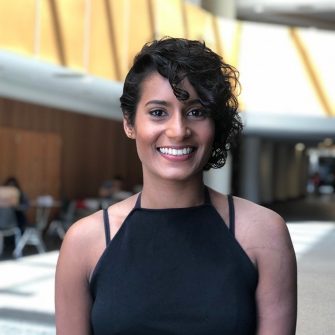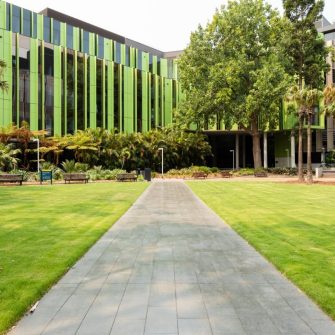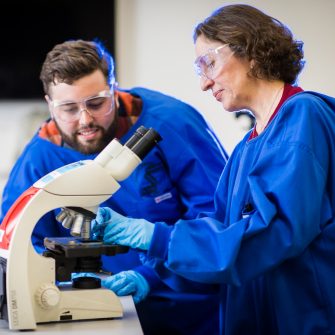Bachelor of Medical Studies / Doctor of Medicine
- Commencing Terms
- Term 1
- Duration
- 6 Year(s)
- Delivery Mode
- Face-to-face (includes blended)
- Campus
-
Kensington
- Codes
- UAC code 428000
- Program code 3805
-
ATAR/2024 lowest selection rank
- ATAR + UCAT ANZ + interview View all admission criteria
-
2025 Indicative first year full fee
- $10,500*
-
2025 Indicative full fee to complete degree
- $75,500*
-
2025 Indicative first year full fee
- $91,500*
-
2025 Indicative full fee to complete degree
- $621,000*

UNSW is introducing a new academic calendar from 2028.
What does this mean for my studies? UNSW is moving to a new ‘flex-semester’ calendar.

UNSW is introducing a new academic calendar from 2028.
What does this mean for my studies? UNSW is moving to a new ‘flex-semester’ calendar.
- Overview
- Entry requirements
- What will I study?
- Careers in medicine
- How to apply
- Fees & Scholarships
Overview
Start your medical career at one of the top medical schools in the world with UNSW ranked #54 globally for life sciences and medicine (QS World University Rankings by Subject, 2025). Through our six-year medical program, you’ll graduate with two degrees – the Bachelor of Medical Studies (BMed) and the Doctor of Medicine (MD). This degree will prepare you for professional practice and empower you to lead the future of health.
The program is renowned for its dynamic blend of hands-on clinical experience and research-focused learning. From your first year, you’ll be applying course content to real-world scenarios and developing your clinical skills in some of Australia’s largest metropolitan and rural hospitals. Your fourth year is dedicated to medical research, where you’ll gain the skills and knowledge to become a change leader in health.
Key features
- Combined undergraduate/postgraduate degree
We’re one of the few universities in Australia that offers a medicine degree at an undergraduate level. You’ll enter our combined program as an undergraduate student and graduate with both a bachelor’s degree and the Doctor of Medicine. After completing the six-year program, you’ll be eligible for provisional registration with the Medical Board of Australia and be ready to commence the next phase of your career.
- Progressive clinical exposure
Immerse yourself in hands-on learning with patient interactions from year one. Practical training and scenario-based learning will build your confidence as a healthcare professional, allowing you to become an innovative clinician who is proficient in teamwork.
- Research skills and experience
In your fourth year, you’ll complete either an Independent Learning Project (ILP) or honours year on a topic of your choice. Research enhances your employability, widens your knowledge as a clinician and opens doors to career opportunities beyond clinical practice, like medical research.
Why study at UNSW?
Study the most in-demand degree in NSW
The Bachelor of Medical Studies/Doctor of Medicine was the most popular first preference choice in NSW for the last six years running (Universities Admissions Centre (UAC), 2018 - 2025).
Learn within a world-class biomedical precinct
You’ll be learning within the Randwick Health and Education Precinct, opens in a new window – a world-leading health, education and research environment. Attracting the best clinicians and academics from around the world, the precinct fosters collaboration between healthcare professionals, providing an environment for ground-breaking research.
Leverage UNSW’s industry connections
Our strong industry links give you the opportunity to learn within Australia’s best hospitals and private practices. Gain valuable exposure to one of the world’s best healthcare systems and work and study as part of interdisciplinary teams on hospital wards. Study alongside some of Australia’s best medical researchers through our affiliated Independent Medical Research Institutes. Leverage our connections to gain professional opportunities and start building your own professional network.
Join our innovative health community
Our health community features award-winning educators, clinicians and leaders in medicine. You’ll have close engagement with our distinguished alumni community of celebrated doctors and researchers. You’ll be welcomed into our supportive community of healthcare professionals, who are working together to improve life for all.
Want to see more from UNSW Medicine and Health?
Entry requirements
Additional Selection Criteria
Assumed knowledge
English Standard. English as a Second Language and Fundamentals of English are not considered suitable preparation
Adjustment Factors
Educational Access Scheme (EAS), opens in a new window
Factors such as illness, financial hardship, language difficulties or attending a particular school can mean you don't always get the best possible marks in Years 11 and 12. If one of these situations applies to you, submit an application for the Educational Access Scheme (EAS) via UAC. Eligible students can receive between 1 and 10 points towards their chosen UNSW degree.
Admission pathways
Our students come to us from many backgrounds and all walks of life. We offer a range of entry schemes to ensure the brightest minds have the opportunity to study with us. Explore your options below and get in touch, opens in a new window with our future student advisors to discuss your path to UNSW.
Visit the special entry schemes, opens in a new window page for detailed information on our medicine pathways, including:
- Gateway Entry Scheme
- Lateral Entry Scheme
- Rural Entry Scheme
- Indigenous Entry Scheme
- Students from other medical schools.
English language requirements
You may be asked to provide evidence of your English proficiency to study at UNSW depending on your educational background and citizenship. English language skills are vitally important for coping with lectures, tutorials, assignments and examinations - this is why UNSW requires a minimum English language competency for enrolment.
If you’re completing an Australian Year 12 qualification (e.g. NSW HSC or equivalent), you do not need to provide anything extra to prove your proficiency. Your qualification will be used as evidence of your English proficiency.
If you do need to provide evidence of your English proficiency, this will be indicated in your application. You can prove this by providing evidence that you meet one or more of the following criteria:
- English language tests and university English courses
- Prior study in the medium of English
- Other qualifications
If you need to improve your English skills before you start your degree, UNSW College’s Academic English Programs are for you. The programs are suitable for various English levels and help you prepare for university studies and life in Australia.
For more details, visit the English Language Requirements page.
Expectations of medical students
Prior to accepting your offer familiarise yourself with the Expectations of Medical Students.
International direct entry
| Qualifications | Direct entry requirement |
|---|---|
|
International ATAR
|
96 + ISAT + interview
|
| UNSW Foundation Studies GPA |
9 + ISAT + interview
|
|
Great Britain General Certificate of Education (GCE A levels)
|
17 + ISAT + interview
|
|
International Baccalaureate Diploma (IB)
|
39 + ISAT + interview
|
|
Scholastic Aptitude Test (SAT) (after 2016)
|
1370 + ISAT + interview
|
We do not accept secondary qualifications from this country. We may accept tertiary study results, please contact us for more information.
Please contact us for direct entry requirements.
Additional Selection Criteria
Admission pathways
If you do not meet the requirements for direct entry into your chosen degree, you may be eligible for a pathway program with UNSW College. UNSW College provides alternative entry options using university-approved content so that you can start your UNSW journey with confidence.
English language requirements
You may be asked to provide evidence of your English proficiency to study at UNSW depending on whether you are from an English-speaking background or non-English speaking background. English language skills are vitally important for coping with lectures, tutorials, assignments and examinations - this is why UNSW requires a minimum English language competency for enrolment.
If English is not your first language, you’ll need to provide proof of your English proficiency before you can be given an offer to study at UNSW. You can do this by providing evidence that you meet one or more of the following criteria:
- English language tests and university English courses
- Prior study in the medium of English
- Other qualifications
If you need to improve your English skills before you start your degree, UNSW College’s Academic English Programs are for you. The programs are suitable for various English levels and help you prepare for university studies and life in Australia.
For more details, visit the English Language Requirements page.
Check the specific English language requirements for this program
Expectations of medical students
Prior to accepting your offer familiarise yourself with the Expectations of Medical Students.
What will I study?
Program structure
Our combined undergraduate/postgraduate program allows you to graduate with two degrees within six years. The Bachelor of Medical Studies/Doctor of Medicine program is split into three phases, with two years in each phase.
Phase One: Scenario-based learning
In your first two years, you’ll learn the basic medical sciences in relation to the human life cycle and social/ethical/legal issues related to healthcare. Clinical and communication skills training also begins in this phase.
Phase Two: Practice-based learning
In your third year, you’ll gain increased clinical exposure in hospital placements with ongoing learning in biomedical and social sciences. Your fourth year is dedicated to research, where you’ll complete either the Independent Learning Project (ILP) or the Medicine Honours Program.
Phase Three: Independent reflective learning
Years five and six consist of clinical placements and include content from the basic medical and social sciences.
Full program structure
The Bachelor of Medical Studies/Doctor of Medicine is completed over six years of full-time study.
Future careers
Our graduates go on to pursue diverse and rewarding careers in a wide range of roles across the medical industry. Further study and experience will allow you to specialise in a specific area of medicine, such as general practice, paediatrics, cardiology, oncology, general surgery, orthopaedics, pathology, radiology or psychiatry. If you choose not to work as a medical practitioner in a hospital or private practice, this degree will also prepare you for other career opportunities in medical research, health policy and medical education.
Accreditation
Upon successful completion of the six-year program, you’ll be eligible to apply for provisional registration with the Medical Board of Australia. This will allow you to commence your one-year hospital internship following graduation, which is required to gain general registration as a doctor in Australia.
Our alumni

“Knowing that UNSW is a leader in medical research was really crucial in my decision making because I know the medical workforce is getting more and more competitive. UNSW builds research into its medical program, which means once you graduate, you’re in a much better position to get a job.”
Ashna Basu
Junior Medical Officer, Prince of Wales Hospital
How to apply
To study the Bachelor of Medical Studies/Doctor of Medicine at UNSW, you must sit the University Clinical Aptitude Test (UCAT ANZ). You’ll also need to apply through UNSW’s Medicine Application Portal before submitting a UAC application. The final step for entry into the degree is an interview.
- Step One: Register for the UCAT ANZ, opens in a new window
- Step Two: Sit the UCAT ANZ
- Step Three: Submit a UAC Application
- Step Four: Apply via the Medicine Application Portal (MAP)
- Step Five: Attend an interview
If you’re successful based on our selection criteria and you’ve submitted your MAP and UAC applications, you’ll be invited for an interview, which will also count towards your overall application.
Admission process for Special Entry
Additional or different steps may need to be taken by applicants that apply under one of our special entry schemes - including Indigenous, Rural and Gateway applicants. Additional information and deadlines are available on our Special Entry Schemes page.
For further information on the application process, visit our dedicated how to apply page
To study the Bachelor of Medical Studies/Doctor of Medicine at UNSW, you must sit the University Clinical Aptitude Test (UCAT ANZ) or the International Student Admission Test (ISAT). You will need to submit an application via our Apply Online portal or through UAC. Applicants who completed a UAC application or are studying in UNSW Foundations are also required to apply via the Medicine Application Portal (MAP).
- Step One: Register for the UCAT ANZ and /or ISAT
Applicants need to provide their ISAT or UCAT ANZ registration number when they lodge their application. Once you have submitted one of the accepted tests of your choice (ISAT or UCAT ANZ), any subsequent submissions of the other test at a later date will not be considered for admission. - Step Two: Sit the UCAT ANZ and/or ISAT
- Step Three: Submit your application through UAC or our Apply Online portal. If you’re sitting an Australian or New Zealand high school qualification, you must apply through UAC. If you’re not sitting an Australian or New Zealand high school qualification, or if you have completed all or part of a tertiary degree program, you’ll need to submit your application via our Apply Online portal.
- Step Four: Apply via the Medicine Application Portal (MAP). This step only applies to applicants who submit a UAC application or applicants studying in UNSW Foundation Studies. Applicants who submit their application via the UNSW Admissions Team (the Apply Online system) are not required to complete an application via MAP.
- Step Five: Attend the interview.
If you’re successful based on our selection criteria and you’ve submitted your UAC/Apply Online portal/MAP applications, you’ll be invited for an interview, which will also count towards your overall application. Interviews are conducted via Zoom. Interviews commence in May and continue throughout the year for the following year’s Term One (T1) commencement.
For further information on the application process, visit our dedicated how to apply page
The information on this page is subject to change. Applicants are advised to monitor this page regularly.
Fees & Scholarships
Commonwealth Supported Place: Student Contribution Band 3
*The student contribution for a Commonwealth Supported Place is an indication only of the amount payable in Year 1 based on a standard full-time load of 48 credit points (1.0 EFTSL). The actual student contribution you will be liable for depends on your individual program of study and the calendar year in which you enrol. Actual fees are calculated upon enrolment. Student contribution amounts are subject to annual review by the university and may increase each year during your studies (subject to caps determined by the Australian Government), effective at the start of each calendar year.
The indicative fees listed here are based on an estimated average and are for tuition only - other fees and charges are not included.
Commonwealth Study Assistance such as Ausstudy, and Youth Allowance is available for some Masters degrees. For the most up-to-date information and list of degrees visit UNSW Current Student Financial Support.
*Fees are subject to annual review by the University and may increase annually, with the new fees effective from the start of each calendar year. The indicative fees listed here are based on an estimated average and are for tuition only, other fees and charges are not included. The amount you pay will vary depending on the calendar year to enrol, the courses you select and whether your study load is more or less than 1 Equivalent Full Time Student Load (8 courses per year).
Indicative fees are a guide for comparison only based on current conditions and available data. You should not rely on indicative fees. More information on fees can be found at the UNSW fees website.
Indicative fees to complete the program have been calculated based on a percentage increase for every year of the program. Fee increases are assessed annually and may exceed the indicative figures listed here.
Indicative fees to complete the program include tuition plus an estimate of study-related costs of approximately $1,000 per year. To find out more about other costs, visit UNSW International.
Scholarships
At UNSW, we award over $83 million in scholarships each year. We pride ourselves on rewarding excellence and making university accessible to students from all walks of life. Whether you’re a domestic or international student, our range of scholarships, prizes and awards can support your journey.

QS World University Rankings, 2025

AFR Top100 Future Leaders Awards, 2020-2025

#1 Australian uni attended by start-up founders





